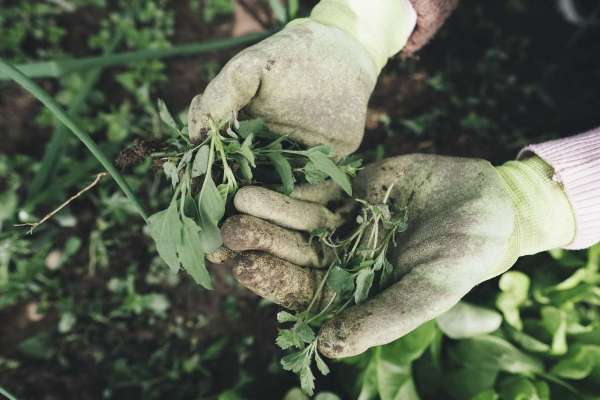
Swap the commercial herbicides that are toxic and expensive for a DIY homemade herbicide like a vinegar weed killer, that is a safer and healthier alternative. These alternatives are affordable and less toxic and you probably have them on hand.
Chemical herbicides have been a go-to for many people when it comes to controlling weeds in their garden or lawn. However, they are often toxic, expensive, and harmful to the environment. Fortunately, there are safer and healthier alternatives that are affordable and can be made at home with just a few simple ingredients. One such alternative is a vinegar weed killer, which has become increasingly popular in recent years.
Vinegar weed killers work by using the natural acidity of vinegar to kill weeds. The high acidity levels of vinegar can damage the leaves and stems of weeds, causing them to wither and die. The best part is that vinegar is non-toxic, environmentally friendly, and affordable, making it an excellent choice for those who are looking for a safer and healthier alternative to commercial herbicides.
To make your own vinegar weed killer, all you need is:
White vinegar
Table salt
Dish soap
Instructions:
Mix one gallon of white vinegar with one cup of table salt in a large container or bucket. Stir until the salt is completely dissolved.
Add one tablespoon of dish soap to the mixture and stir gently. The dish soap helps the solution to stick to the leaves and stems of the weeds.
Transfer the mixture to a spray bottle and spray it directly onto the weeds. Be sure to cover the entire plant, including the leaves and stems.
Wait for the solution to dry completely before watering the area again.
It’s important to note that vinegar weed killers work best on young weeds with shallow roots. For more established weeds, you may need to use the vinegar solution multiple times to see results. Additionally, vinegar can be harmful to other plants as well, so be sure to use it sparingly and avoid spraying it on plants you want to keep.
Another natural alternative to chemical herbicides is using boiling water. Simply boil a pot of water and pour it over the weeds, being sure to cover the entire plant. This method works best on weeds growing in cracks or pavement, as the boiling water can also damage nearby plants.
swapping chemical herbicides for natural alternatives like vinegar weed killers or boiling water is a safer and healthier option for controlling weeds. These alternatives are affordable and less toxic, and you probably have the ingredients on hand already. By making the switch, you’ll not only be doing your part to protect the environment but also creating a healthier and safer space for you and your family. So why not give it a try and see the results for yourself?
Here are 5 different variations of DIY weed killer recipes, along with information on what weeds they are effective in killing:
Vinegar weed killer: This is a simple and effective recipe that works best on young weeds with shallow roots. Mix together one gallon of white vinegar, one cup of table salt, and one tablespoon of dish soap. This mixture is effective in killing weeds such as dandelions, chickweed, and clover.
Salt and vinegar weed killer: Combine two cups of white vinegar with one cup of table salt and one tablespoon of dish soap. Mix until the salt is fully dissolved, then spray the mixture onto weeds. This recipe works well on weeds that grow in sidewalk cracks or gravel driveways, such as thistle or plantain.
Baking soda weed killer: Mix together one tablespoon of baking soda, one tablespoon of dish soap, and one gallon of white vinegar. Stir until the baking soda is fully dissolved, then transfer the mixture to a spray bottle and spray directly onto weeds. This recipe works well on weeds such as crabgrass, plantain, and clover.
Citrus oil weed killer: Mix together one quart of white vinegar, one tablespoon of dish soap, and one ounce of citrus oil (such as lemon or orange). Stir the mixture well and transfer it to a spray bottle. This recipe works well on weeds such as thistle and dandelions.
Boiling water weed killer: Boil a pot of water and pour it directly onto weeds. This recipe works well on weeds that grow in sidewalk cracks or driveways, as the boiling water can also damage nearby plants. This method is effective in killing most types of weeds, including crabgrass and dandelions.
It’s important to remember that these DIY weed killer recipes can harm desirable plants and animals if not used responsibly. Always follow the instructions carefully and avoid using these methods near bodies of water or where they could harm beneficial insects and animals. If you’re unsure about the safety or effectiveness of a particular recipe, it’s always best to consult with a professional before using it.


